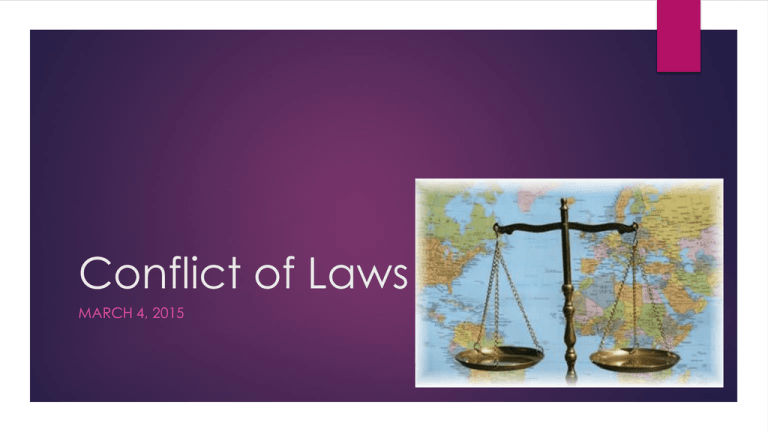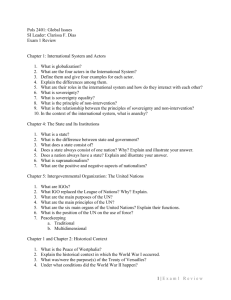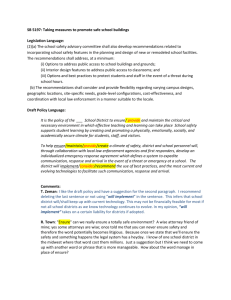Conflict of Laws
advertisement

Conflict of Laws MARCH 4, 2015 Introduction to the summer term ivana.lukica@pravo.hr office hour: Wednesday 11:00 – 12:00 English for Lawyers, Units 27-34 presentations will be available at: http://www.pravo.unizg.hr/SJ/predmet/ejps4/nastavni_materijali/ivana_luk ica Schedule March 4: Introduction to the summer term and Conflict of Laws March 11: English Civil Law – Contract law March 18: Tort law March 25: Negligence April 1: Forms of Business organizations in the UK and the USA April 8: Economic, Social and Cultural Rights April 22: Judicial Control of Public Authorities April 29: Police Powers in Great Britain Rules and regulations everyone will get their indeks signed conditions free end-of-term exam requirements: clean attandance sheet (no absence) if absent 1-3 time s - introduction to the topic - anylsis of the topic (classifications, pros and cons,…) - conclusion (objectively and subjectively) - quoting is necessary, references are necessary topic is to be chosen from this term’s topics lenght: 3-5 standard pages (1 page=1800 characters with blank spaces) a written assignement: End-of-term exam covers the term’s topics - factual knowledge - vocabulary (collocations, phrasal verbs, archaic terms) - grammar (discourse markers, conjunctions) materials from the coursebook and the presentations every nation possesses an exclusive sovereignty and jurisdiction within its own territory the laws of every state, therefore, affect and bind directly all property, whether real or personal, within its territory; and all persons who are resident within it, whether citizens or aliens, natives or foreigners; and also all contracts made, and acts done within it a state cannot, by its laws, directly affect or bind property out of its own territory, or persons not resident therein, whether they are natural born or naturalized citizens or subjects, or others when the laws of different countries, on the subject-matter to be decided, are in opposition to each other, it becomes necessary to decide which law is to be obeyed conflict of laws/private international law it is not necessarily international as it may refer to laws between states in a federation, provinces in a state, cantons in a confederation or a republic… Private international law a) the law that is administered between private citizens of different countries b) a set of rules and regulations that are established or agreed upon by citizens of different nations who privately enter into a transaction and that will govern in the event of a dispute c) concerned with the definition, regulation, and enforcement of rights and obligations in situations where parties are private citizens of different nations may arise in any area of private law (family law, inheritance law, contract law, tort law, company law, intellectual property law…) e.g. divorce between citizens of different countries, inheritance tax, buying property in a different country, accidents in a different country, registering patents in a different country… the term was first used by the American lawyer, Supreme Court Justice and scholar Joseph Story in ”Commentaries on the Conflict of Laws foreign and domestic, in regard to contracts, rights, and remedies, and especially in regard to marriages, divorces, wills, successions, and judgments” in 1834 nowadays, the term is prefered in civil law countries Conflict of laws the term was first used by a Dutch law professor and philosopher Ulrich Huber in ”De Conflictu Legum Diversarum in Diversis Imperiis” in 1689 nowadays, the term in used in commom law countries as they consist of several jurisdictions (the UK, the USA, Australia…) Main topics choice of jurisdiction (whether the court in question is appropriate to resolve a dispute) choice of law (which law should be applied) enforcement of foreign judgements (whether the court in question recognizes the judgement of a foreign court) Governing law Regulation on Jurisdiction and the Recognition and Enforcement of Judgments in Civil and Commercial Matters (EU) Convention on the Recognition and Enforcement of Foreign Arbitral Awards - the "New York" Convention Questions What is conflict of laws/private international law? In which areas of law can it arise? Give a few examples. When and where did the term Conflict of laws first occur? When and where did the term Private International Law first occur? Which term is preferred in common law countries? Why? What are the main topics of conflict of laws? Explain. What are the two most important documents regarding this topic? Vocabulary citizen/alien to bind citizens/aliens by law dispute to resolve a dispute enforcement to enforce rights/obligations jurisdiction to possess jurisdiction personal property to bind property by law real property to possess property rights and obligations to possess rights and obligations rules and regulations to establish rules and regulations sovereignty to possess sovereignty Thank you!





